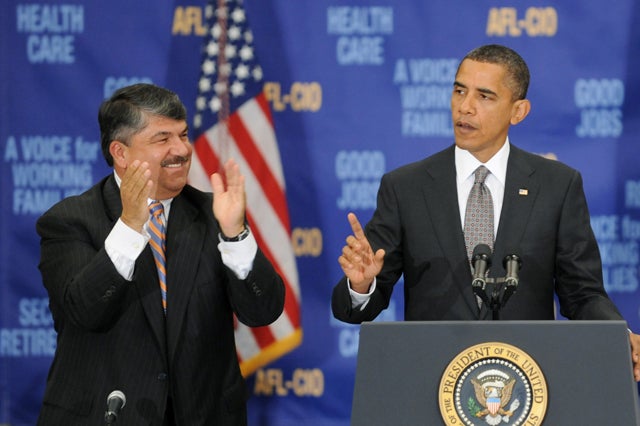Union Boss Trumka: Spend More, Mr. President
Mike Brownfield /
Some people will never be satisfied. Case in point: AFL-CIO president Richard Trumka, who today lambasted President Barack Obama for not doing enough to create jobs—which in his world means “spend more on infrastructure so my union constituency benefits.” Unfortunately for America, Obama has already done too much spending. USA Today reports on the union leader’s remarks at a breakfast sponsored by The Christian Science Monitor:
Trumka said that, rather than cut, the government needs to spend more money on infrastructure to update crumbling highways, rails and other public entities, as well as to create jobs…. Trumka said the creation of jobs through more infrastructure spending could help bring down the rest of the deficit.
Trumka’s grievances about “not enough spending” come even though President Obama has already won a $787 stimulus bill laden with infrastructure spending, called for another $50 billion to be spent on the same policy last summer, has made pledges, promises, and plans to spend billions on building bridges and roads throughout his presidency, and now appears poised to do the same once again in September. And despite all the spending, the Congressional Budget Office (CBO) projects that unemployment will remain above 8 percent until 2014.
Trumka has another complaint, too—that people get job creation and deficit reduction “confused.” But therein lies his confusion. Trumka is under the delusion that more spending creates jobs and that growing deficits aren’t a problem. In reality, infrastructure spending does not create jobs, and America’s deficit crisis is hindering job growth.
Heritage’s Ronald Utt documented reports from the CBO, Department of Transportation, Congressional Research Service (CRS), and Government Accountability Office, all of which concluded that the net job impact of federal transportation spending is negligible and possibly negative. A 1993 CRS report explains why:
To the extent that financing new highways by reducing expenditures on other programs or by deficit finance and its impact on private consumption and investment, the net impact on the economy of highway construction in terms of both output and employment could be nullified or even negative.
The ineffectiveness of infrastructure spending aside, there’s another problem: Deficit spending causes long-term problems for the economy. Brian Riedl writes in The Wall Street Journal:
[L]arge stimulus bills often reduce long-term productivity by transferring resources from the more productive private sector to the less productive government. The government rarely receives good value for the dollars it spends. However, stimulus bills provide politicians with the political justification to grant tax dollars to favored constituencies. By increasing the budget deficit, large stimulus bills eventually contribute to higher interest rates while dropping even more debt on future generations.
So if infrastructure spending doesn’t create jobs, why call for even more of it? In order to placate labor unions. Read more about it in Utt’s paper, “Infrastructure Stimulus Spending: Pandering to Organized Labor.”

